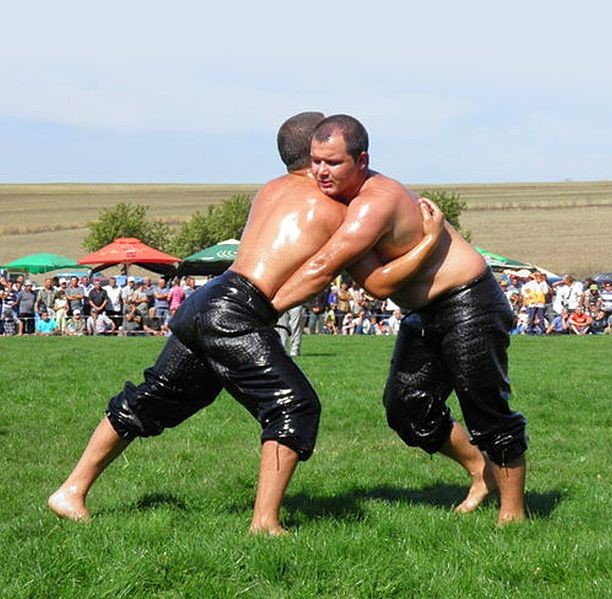
© PZ. IStP, 2013 |
|
|
|
|
| General Information |
Kirkpinar oil wrestling is the most popular traditional wrestling in Turkey. As the sport’s name suggest, the wrestlers douse themselves with olive oil and wear knee-length leather trousers. The trousers called kispet are an important factor for winning the game, and thus it is tailored for individual wrestlers.Before the match the wrestlers engage in a ritual called peshrev, a warmup to strengthen their morality and excite the spectators. A traditional announcer called cazgir recites poems and prayers. |
| History/Development |
Kirkpinar oil wrestling festival originated in the 14th century in Southwestern region of Turkey, making it one of the world’s most historical sports festivals. Some sources suggest that the first oil wrestling tournaments were first held in 1361, when the Ottomans was to conquer Rumelia (Aral 2020). The Ottomans stopped at a village near Edirne to take rest, and 40 Ottoman soldiers began wrestling competitions. It was arranged to encourage the troops and celebrate the success of their expedition. Legend has it that the last two soldiers were unable to defeat each other not wanting to stop their match, and they eventually died (Aral 2020). They were buried exactly where they were wrestling, and years later, their friends visiting the place “found a pinar (spring) flowing from the graves” (Aral 2020: 111). Commemorating the two and other wrestlers, people named the place kirkpinar - kirk meaning forty, the total number of wrestlers. |
Transmission
(Policies/institutions) |
In 2010, the Kirkpinar oil wrestling festival was inscribed on the UNESCO Representative List of the Intangible Cultural Heritage of Humanity. This was made possible by the cooperation of many stakeholders such as Turkish government, the Edirne municipality, Trakya University, and other NGOs (Aral 2020).
Efforts to promote and safeguard the oil wrestling tradition have been consistently made. The matches during the festival are broadcasted through various radio and television channels locally and nationally. The government and media have also collaborated and produced documentary films about the wrestling and the wrestlers’ lives.
There are 27 training centres nationwide accepting 400 students every year. |
| Relevant Organisations |
|
| Additional Materials |
|
| References |
- Aral, A. (2020). “Maintenance of Cultural Identity in a Shared Context: Kirkpinar Traditional Oil Wrestling” in: Living Heritage Series - Traditional Martial Arts as Intangible Cultural Heritage, Chungju: ICM and ICHCAP | | |